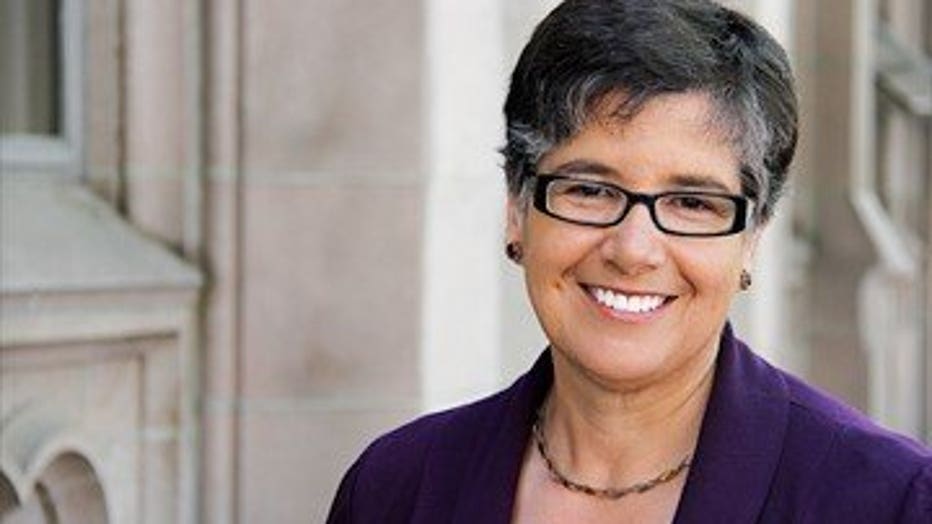University of Washington President Ana Mari Cauce to step down in 2025
SEATTLE - University of Washington President Ana Mari Cauce will be stepping down from her role next year.
Cauce announced on Wednesday that she will be stepping down at the end of her second five-year term in June 2025 and return to her faculty position.
"I may do some guest lecturing," said Cauce.
The transition has been planned for several years with the UW Board of Regents, according to the university.
"Next year will be my last year as president of this university. It has been the absolute honor of a lifetime, and I am very much focused on making next year an amazing year," Cauce said in her announcement.
Cauce joined the UW faculty in 1986 as an assistant professor of psychology and rose to become the university's provost and executive vice president before being named interim president and then becoming UW’s 33rd president in 2015.
She is the first woman, first Latina and first openly gay person to hold the position at the Seattle university.
She was born in Cuba and left the country with her family during the revolution when she was 3 years old. Her father had been minister of education in Cuba.

She has spent nearly her whole professional career at UW and has held numerous leadership positions.
"Ana Mari Cauce is an outstanding president, who has led the UW through some of the most tumultuous times in its history. She has advanced the University’s public mission through partnerships with legislators, civic leaders, and the philanthropic community," David Zeeck, Chair of the UW Board of Regents said in a statement on behalf of the Board. "Few university presidents now serve 10 years. The University has been fortunate to have Ana Mari in this position since 2015."
The university said the Regents will be sharing more details about the search for her successor in the coming weeks.
As Ana Cauce looks ahead to the future, she’s also reflecting on some of her greatest accomplishments as UW president, including the Huskey Promise.
"It’s a promise we make to low-income students that if they can get into the university they will not have to pay tuition," said Cauce.
Advancements in research and patient care are other areas of achievement she’s proud of.
"Our hospital system has really expanded and we have this partnership with Fred Hutch now, so that we are really doing better and more integrative work as far as cancer treatment," said Cauce.
She also faced challenges during her time as president, including the COVID crisis, with the university being the first to go fully remote. Recently, she also had to address a pro-Palestine encampment, which was disbanded following talks with the university.
"More recently we’ve really been dealing with world events; the issues, Palestine, Gaza, Israel. We also dealt with, I remember, Milo Yiannopoulos and the Trump election was also one that really roiled college campuses," she said. "It really has been a dynamic time with a whole range of crisis, including reproductive health."
Despite the timing, she says her decision to step down had nothing to do with the recent encampment.
"This has been long in the making. The regents had known as soon as I started my second 5-year term, and certainly we started talking about it in earnest about a year ago- so-No," said Cauce.
She also addressed recent challenges after the arrest of former University of Washington football player Tylin Tybo Rogers. He was charged with felony rape after two women claimed he attacked them. He pleaded not guilty, but critics said he wasn’t removed from the team fast enough when allegations first were made.
"We have Title 9 rules and I really think they did the very best job possible, given the information we had at the time," said Cauce. "We can’t act in one moment based on information we didn’t get until later."
As she heads into her final year at the University of Washington, she says she’s committed to advancing the work of the university.
"There is a lot of work to do and I’m laser focused on that," she said.
She believes the next frontier for UW could be the study of artificial intelligence and a focus on potential cures or treatments for Alzheimer’s Disease.
"AI has been around for a while, but now it’s’ getting to a point that it can be more a part of our everyday life. We are trying to figure out how to use it in the most positive sense of the word," she said.
MORE UNIVERSITY OF WASHINGTON HEADLINES FROM FOX 13 SEATTLE
UW: Device helps people with spinal injuries improve hand function
UW alum steers U.S. men's eight crew to 2024 Olympic Games in Paris
UW President calls for ceasefire in Gaza, condemns encampment
The Associated Press contributed to this report.
To get the best local news, weather and sports in Seattle for free, sign up for the daily FOX 13 Seattle newsletter.

